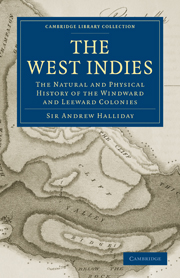Book contents
- Frontmatter
- Contents
- CHAPTER I
- CHAPTER II
- CHAPTER III
- CHAPTER IV
- CHAPTER V
- CHAPTER VI
- CHAPTER VI
- CHAPTER VII
- CHAPTER VIII
- CHAPTER IX
- CHAPTER X
- CHAPTER XI
- CHAPTER XII
- CHAPTER XIII
- CHAPTER XV
- CHAPTER XVI
- CHAPTER XVII
- CHAPTER XVIII
- CHAPTER XIX
- CHAPTER XX
- CHAPTER XXI
- CHAPTER XXII
- APPENDIX I
- APPENDIX II
- Plate section
- Frontmatter
- Contents
- CHAPTER I
- CHAPTER II
- CHAPTER III
- CHAPTER IV
- CHAPTER V
- CHAPTER VI
- CHAPTER VI
- CHAPTER VII
- CHAPTER VIII
- CHAPTER IX
- CHAPTER X
- CHAPTER XI
- CHAPTER XII
- CHAPTER XIII
- CHAPTER XV
- CHAPTER XVI
- CHAPTER XVII
- CHAPTER XVIII
- CHAPTER XIX
- CHAPTER XX
- CHAPTER XXI
- CHAPTER XXII
- APPENDIX I
- APPENDIX II
- Plate section
Summary
In the early stages of colonization, the pestilential vapours arising from the literally boiling mud and undrained marshes of this low and extended coast, must have proved very destructive of human life, and none but a native of Walcheren could possibly have survived above one season. Tradition, indeed, assures us, that in those days even the Dutchman would not put himself to the expense of a new coat until he found he was safe at the end of the sickly season, and that the first moon in October had shown her horns. Some doctor of these ancient days has recorded for the information of his countrymen what they had to expect on their first arrival. The original was in good Hollands, or Low Dutch, but the translation I have met with runs as follows:—
In July you may die,
In August you must,
In September remember,
In October all's over.
But “on a changé tout cela;” the sickly season has not lost the whole of its power, it is still accompanied by much sickness, but, under proper management and judicious treatment, the mortality even of August is not more than in any other month. We have here one of the most striking effects of the influence of cultivation upon climate that could possibly be adduced.
In addition, however, to what may be called the Marsh-poison, the irregular lives of Europeans in the olden times must have added considerably to the annual mortality.
- Type
- Chapter
- Information
- The West IndiesThe Natural and Physical History of the Windward and Leeward Colonies, pp. 245 - 266Publisher: Cambridge University PressPrint publication year: 2010First published in: 1837



